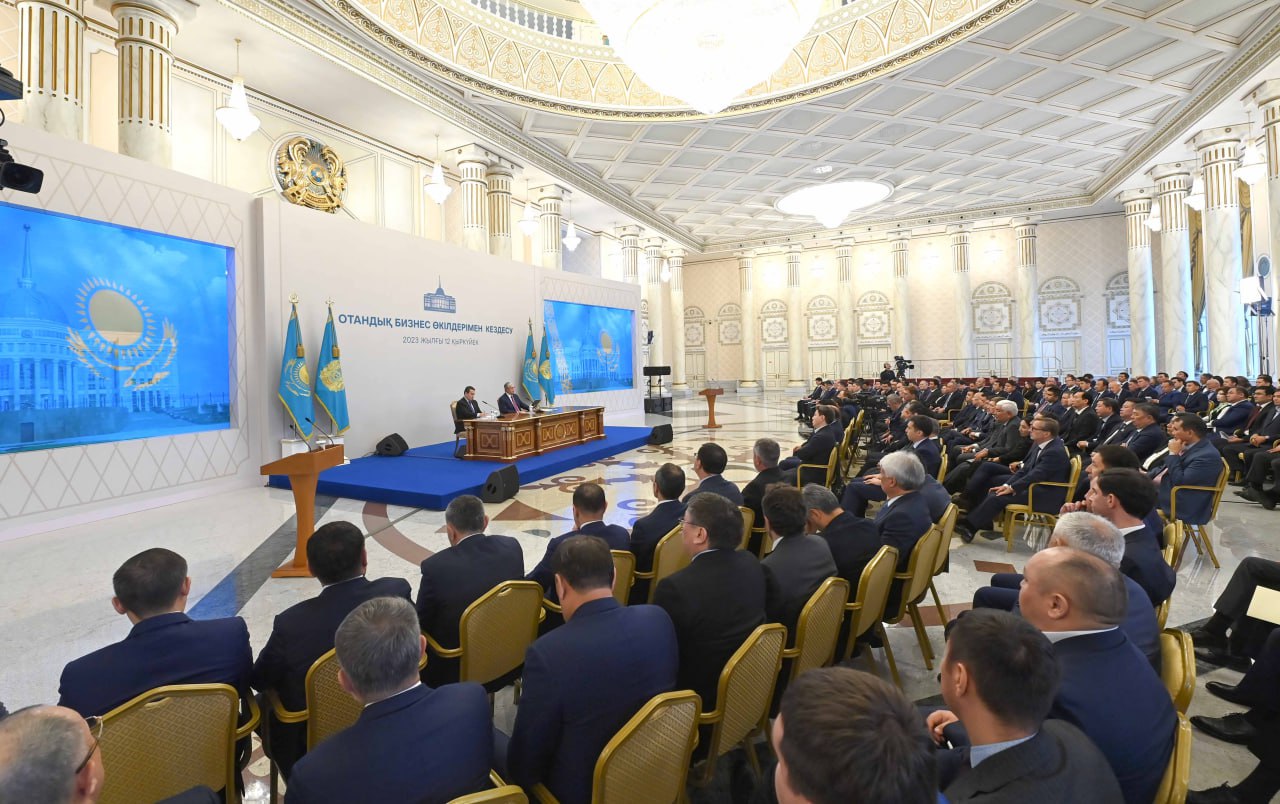ASTANA – Kazakh President Kassym-Jomart Tokayev called for a completely new model of relations between the state and businesses as he addressed the country’s business leaders on Sept. 12 in Astana, reported the Akorda press service.

President Tokayev called for a completely new model of relations between the state and businesses as he addressed the country’s business leaders. Photo credit: Akorda.
Tokayev mentioned the new economic development model proposed in the state-of-the-nation address on Sept. 1. He stressed the need to achieve a minimum of 6% to 7% annual economic growth.
“Despite existing measures to support private business initiatives, the pace of business development still does not match the existing potential. We need a qualitative breakthrough,” the President said.
New social contract in economic development
Tokayev invited businesses to work under a new set-up, where the state creates the most favorable conditions for business development and provides full protection of private property. In turn, he expects entrepreneurs to fulfill their obligations, including paying taxes, investing in the economy, and creating jobs and comfortable working conditions for their employees.

Photo credit: Akorda.
“The state should not treat every business person as a potential lawbreaker. This approach gives rise to an inherently repressive nature of administration. The state must help entrepreneurs,” he said.
Priority tasks in business development
Outlining priority tasks, he spoke about ensuring the rule of law and the protection of private property. Crimes, including economic ones, must be addressed solely through legal means.

Photo credit: Akorda.
“Excesses do not correspond to the interests of the state. They discredit Kazakhstan and undermine people’s trust in my initiatives. We need to create a balanced control mechanism,” Tokayev said.
He also suggested creating an independent cassation authority, which is supposed to ensure high-quality protection of the rights of citizens.
Tokayev noted that over 60% of court decisions are made in favor of citizens and businesses. However, there is a problem with the government’s mistakes that lead businesses to court.
The government, the Supreme Court, and the Atameken National Chamber of Entrepreneurs have been told to carefully study what government agencies are doing wrong and fix those problems effectively.
The law on the return of illegally acquired assets to the economy, signed by Tokayev in July, is meant to ultimately “heal the economy and prevent social stratification.”
“Conscientious business, foreign and Kazakh investors have nothing to fear,” said the President.
Tokayev encouraged the country’s established business people in the country to get involved in big projects in such fields as metallurgy, chemistry and machinery. According to him, investments in such production will be considered a serious bid to prove the legality of the origin of assets.
Tax policy reform
Another key goal is to ensure fair taxation that stimulates the economy and tackles tax evasion. Tokayev focused on significant imbalances in tax revenues and noted the need to improve tax policy.
Nearly 80% of all taxes in the country are paid by only 260 companies, said Tokayev. He cited experts who estimate four million people out of the total employed population do not pay taxes on their income.
“Micro and small businesses, even with simplified taxation, hide and understate their turnover,” Tokayev said, noting the main goal of the new tax policy is to make it easier for more people to pay taxes by simplifying the process and working effectively with the public and businesses.
Promoting industrialization
Industrialization was also on the meeting agenda. Tokayev emphasized that a strong and stable economy relies on a thriving manufacturing industry, especially in the middle and upper market segments.
Tokayev said there are significant challenges in this area, as shown by the low number of businesses that survive in the country.
“Only a quarter of companies remain on the market in the second year after opening. For comparison, this figure is 70-80% in other countries. In many ways, this is evidence of the imperfect business climate in Kazakhstan,” said Tokayev.
Increasing localization of oil and gas industry
According to him, the oil service industry should drive growth and diversification of the domestic economy, including by engaging more domestic producers in projects.
The planning for projects in the country’s giant fields, Tengiz, Kashagan, and Karachaganak, takes place abroad. Tokayev noted that Tengizchevroil’s Future Growth Project also relies on materials and equipment from abroad, limiting opportunities for local producers to participate in these major projects.
“Local content in goods used in the largest projects [Tengiz, Kashagan, Karachaganak] does not reach even 5%. The government should push for the relocation of project design offices to Kazakhstan with the mandatory involvement of local engineers and companies,” the President said.
Development of medium-sized business
The next important task is to accelerate the development of medium-sized businesses. While the government offers favorable conditions for small and large businesses, small businesses lack incentives to transition to the more significant medium-sized business category.
“The share of small and medium-sized businesses in the gross domestic product (GDP) has increased over the past seven years. However, the main driver of this dynamic is small businesses, which increased by 46%. The medium-sized business grew by only 0.5%, increasing its share in the economy from 5% to 6.2%,” Tokayev said, calling for special conditions to support medium-sized businesses, notably in the manufacturing industry.
Tokayev reiterated the tasks he gave in his address to provide special measures of state financial support and preferential access to state tenders for businesses that use standard tax regimes. He also directed the government to improve the quality of support measures.
